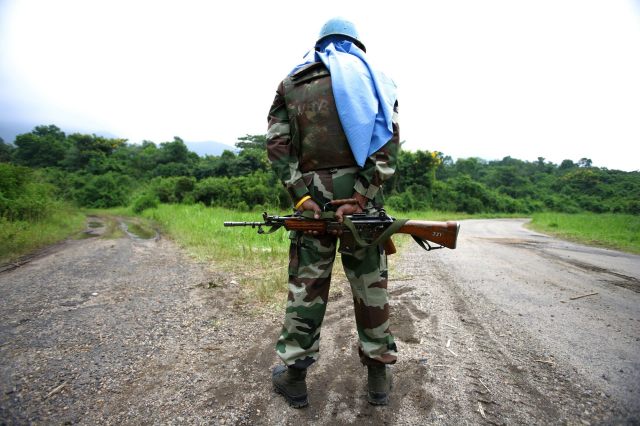Credit: Brent Stirton/Getty Images

Where economies have been devastated, women and girls often pay the highest price. As they become desperately poor, the exploiters and sexual predators step in. And wherever foreign ‘peacekeeping’ forces are stationed, local prostitution markets increase.
In the late-1990s, I witnessed North American United Nations (UN) personnel visiting a local brothel in Pristina, Kosovo. Despite warnings that anyone caught frequenting such places would be disciplined and sent home, the men were never called to task, and buying and using women and girls for sex became embedded within so-called peacekeeping culture.
In the Democratic Republic of the Congo (DRC) in 2003, there were 150 allegations of sexual assault by peacekeepers at MONUC (the new name for the United Nations Mission there). These allegations included rape, child abuse and prostitution. Reports also alleged instances of torture, the pornographic filming of Congolese women and children by UN peacekeepers, and the fathering of babies by these men. One case even included an employee who filmed himself torturing and sexually assaulting naked young girls.
The exposure of this abuse in 2004 by a number of UN peacekeepers in the DRC resulted in UN staff admitting they had seen male colleagues exploiting young and vulnerable locals during overseas missions. This sparked the start of a genuine effort to end such corrupt practices. But the problem hasn’t gone away.
In 2016, there were 65 allegations of sexual exploitation and abuse against civilians, and 80 allegations against female colleagues by male UN personnel. There were at least 311 known victims, of whom 309 were female. Not enough is being done to protect these vulnerable individuals from the very people whose job it is to help them.
Some of the vile acts committed by UN personnel are not even criminal, such as paying for sex in countries where the sex trade is so normalised that the punters are free to do whatever they want to prostituted women. I have spoken with several people close to the UN who even use the casual term ‘transactional sex’ to sanitise the act of sexual exploitation that takes place via prostitution. One UN woman told me: “I have heard men justify buying sex from desperate, teenaged women in [African countries] by claiming that they are helping her feed her kids.”
The problem, of course, is not confined to UN personnel. A seasoned aid worker who asked to remain anonymous says that sexually abusing or exploiting people in developing countries is fundamentally inconsistent with the UN’s obligations to improve the human rights of citizens. “But this applies as much to employees of oil companies or accountancy firms [based in developing countries] as it does to aid workers or peacekeepers,” she says. “Often we find that private contractors are not held to account anywhere near as vigorously as are international civil servants or NGO workers. An evening spent in a bar in Abuja, Accra or Baku reveals the massive level of men buying sex from local girls, boys and women, yet men in general, never mind the UN, are subject to very little scrutiny or accountability.”
In January 2017, UN Secretary General António Guterres established a high-level task force within the UN to identify and eradicate sexual exploitation and abuse. This was in response to the scandal in the Central African Republic in 2017 when several children were sexually abused by a French peacekeeping force that was under UN control. Since then, more cases have emerged.
One senior staff member tells me: “It is almost impossible for victims to report such incidents because they are either not believed or not adequately supported through a criminal trial, and are often stigmatised and punished by their family members and wider communities for speaking out.”
The 2017 appointment of Jane Connors, the first Victims’ Rights Advocate for the UN is a positive step. I recently visited the UN and saw Connors in action. I was told by several people involved in combatting sexual abuse that Connors is passionate about giving victims a voice, and holding perpetrators responsible. Connors has made a tangible impact in encouraging victims to come forward, and so far, has visited the Central African Republic, Haiti and South Sudan in order to train Victims’ Rights Advocates, which she describes as “the operational reflection of my policy”.
Connors has driven home the need for a victim-centred, child-sensitive and non-discriminatory approach in dealing with those who have experienced sexual violence and exploitation.
While the UN is obviously taking abuse by its peacekeepers seriously, it seems at a loss as to how to end it. My personal view, informed by almost four decades of campaigning against sexual abuse of women and girls, is to put in place hard-hitting, no-nonsense sanctions in order to deter potential perpetrators. That means stringent, public and internal disciplinary proceedings in cases where there is any corroborating evidence, and the threat of criminal sanctions and job losses.
In his 2018 report on special measures for protection from sexual abuse, Guterres said: “I have repeatedly affirmed that sexual exploitation and abuse will not be tolerated by the United Nations.” He added: “No individual serving under the United Nations’ flag should be associated with sexual exploitation and abuse.” It is outrageous that that still needs to be said.
The extent of sexual abuse during UN missions is shocking and disturbing. The very men who are tasked with making life better for these already traumatised women are making their lives infinitely worse. The UN must be held to account for its employees’ behaviour. It must take responsibility for the fact that the vast majority of sexual assault and exploitation is by humanitarian workers in unregulated NGOs. Strong words are not enough.










Join the discussion
Join like minded readers that support our journalism by becoming a paid subscriber
To join the discussion in the comments, become a paid subscriber.
Join like minded readers that support our journalism, read unlimited articles and enjoy other subscriber-only benefits.
Subscribe